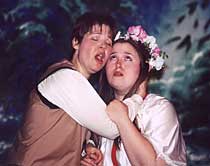The Brothers Grimm fairytale about Hansel
and Gretel, the two resourceful children who successfully fend
off a wicked witch who lives in a gingerbread house, has scared
the pants off kids (and parents) for nearly two centuries in
its original form, which is grim indeed.
Luckily for Regina Opera, the operatic "Hansel and Gretel"
by German composer Engelbert Humperdinck – not to be confused
with the ’60s British pop idol who took the composer’s name and
will perform at Brooklyn Center on Feb. 28 – truncated much of
the nastiness of the original in favor of a far less menacing
tale.
"The opera is not nearly as dark as the original fairytale,"
says Linda Cantoni, who is directing the Regina Opera production
that plays Nov. 22-23 and Nov. 29-30 at Regina Hall in Dyker
Heights. "Humperdinck and Adelheid Wette [the composer’s
sister, who also penned the libretto] originally wrote it as
a Christmas entertainment for their family. For example, the
children are not sent out into the woods to starve [as they are
in the Grimm original] but only to pick strawberries."
Humperdinck’s opera, a holiday favorite since its premiere in
Weimar, Germany, in 1893, was last done at Regina five seasons
ago. Although this month’s production is basically the same,
there have been a few tweaks, Cantoni said.
"It’s a traditional production, but we’ve changed it slightly,"
she explains. "What I did the last time was to add a non-singing
character – a gnome – who was the witch’s assistant. This time,
we’re going to have an apprentice witch instead.
"The reason is, essentially, the witch has a lot to do,
because she has to grab hold of and restrain Hansel and Gretel.
So it creates a little more comedy out of the situation. The
gnome was a little more wacky, and the apprentice [played by
15-year-old Katie Cohen, niece of Regina’s chairman of the board,
Fran Garber, and already a veteran of the Regina Opera stage]
is a little more goofy. But the assistant ends up being very
grateful to Hansel and Gretel for freeing her from her enslavement
at the end. She rejoices with everyone, and helps them pull the
large cookie out of the oven that was once the witch."
Although the opera is considered family entertainment, it’s not
a musical lightweight by any means, explains Regina Opera conductor
Jose Alejandro Guzman: "Humperdinck was actually an assistant
of Richard Wagner’s, and in fact, the excerpts from Wagner’s
Ring cycle that are played in concert halls are by Humperdinck.
He is the quintessential example of someone trying to mimic a
great master."
Since Wagner’s operas are notorious for their difficulties for
singers, musicians and conductors, it follows that Humperdinck’s
score for "Hansel and Gretel" is no slouch in that
department either, which Guzman affirms.
"It’s a vicious score to learn," he says. "It’s
Wagnerian in its structure, vocal lines and orchestration. The
only thing light and family-friendly about it is the story."
Newcomers to the opera may be surprised to see females singing
both title roles, even though Hansel is a boy. (Joan Callinghan
and Mabel Ledo alternate as Hansel, while Gretel is played by
Hayley Kobilinsky and Karen Sprung.) The reason, of course, is
the complex music.
"Singers who do this can’t be children," Guzman says.
"The role of the witch is extremely difficult to sing, and
Hansel is also tough. From a musical sense, it’s one of the most
challenging operas out there. But our orchestra adores it, because
even though it’s fiendishly difficult and extremely sophisticated,
musically, it’s beautiful to play and hear."
Of course, Humperdinck composed "Hansel and Gretel"
for a large, Wagner-sized orchestra, which Regina Opera does
not have. So what is the answer in a case like this?
"Companies like ours use what are known as reductions,"
Guzman explains. "Almost any opera has its original orchestration
for large orchestras, but they make adaptations for smaller orchestras.
I made the reduction we are using: we looked at the original
score and kept the sounds we need, but for fewer instruments.
If we do it correctly, it’s difficult to tell if it’s reduced.
The effect is still the same."
Like most small opera companies, Regina Opera tries to take advantage
of its modest size.
"Using reductions is economically feasible for smaller companies,
and they are standard in the opera world," Guzman says.
"Money is every object for us. We’re proud of our orchestra,
which allows us to use real singers, because you can’t fake it
over a good orchestra."
For her part, director Cantoni hopes audiences enjoy this "Hansel"
as much as they did the last one.
"We always have many families and children in the audience,"
she says. "When the witch gets pushed in the oven, everyone
cheers, which is wonderful! We want to please everyone by maintaining
the spirit of the original: it ends happily."
Regina Opera presents "Hansel and
Gretel" on Nov. 22-23 and Nov. 29-30 at 4 pm, at Regina
Hall, on the corner of 12th Avenue and 65th Street in Dyker Heights.
Tickets are $15; $10, all students, seniors and children. For
more information, call (718) 232-3555 or visit www.reginaopera.org
on the Web.

























